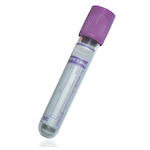Thiopurine S-Methyltransferase (TPMT)
Specimen Volume
4 mL whole blood (paediatric 2 mL)Specimen Transport
For internal users, transport via usual mechanisms. For external laboratories, store at 4ºC prior to transport, and send by first class post.Sample Preparation
Turnaround Time
14 daysSample Processing In Laboratory
DO NOT CENTRIFUGE. Store specimens at 2-8ºC.Sample Stability
Store whole blood at 2-8ºC (stable for 2 weeks). For longer stability, store aliquots suitable for analysis frozen.General Information
Thiopurine drugs, such as azathioprine and mercaptopurine, are widely used as immunosuppressants in gastroenterology, dermatology and post-transplant etc. Thiopurine drugs are metabolised by two major pathways — by the enzyme xanthine oxidase and thiopurine S-Methyl-transferase (TPMT). Individual patients vary greatly in susceptibility to the toxic effects of these drugs, due to genetic differences in drug metabolism. TPMT is absent in approximately 1 in 300 people, and around 11% of the population have low activity. Patients who fall into these categories are at risk of severe side-effects. The measurement of TPMT levels at the start of thiopurine therapy allows the dose of thiopurine drugs to be adjusted appropriately for successful treatment.
In addition to TPMT activity detemination, genetic analysis is also carried out. To date more than 20 single-nucleotide polymorphisms (SNP) have been associated with decreased TPMT activity. The most common defects leading to inactivated alleles are G238C mutation in exon 5 (TPMT*2), point mutations in A719G in exon 10 and G460A in exon 7 (TPMT*3A), and an isolated mutation in position A719G (TPMT*3C). These cause rapid degradation of the protein by an ATP dependent proteosome mediated pathway, resulting in loss of catalytic activity of the enzyme.
Patient Preparation
Patient should not have had recent blood transfusions (both phenotype and genotype results affected).
TPMT activity should be determined BEFORE starting on thiopurine drugs
Notes
Drugs such as aziathioprine have been reported to induce TPMT activity, and sulfasalazines can inhibit TPMT activity.
Renal impairment can cause false elevations in TPMT activity
Reference Range
TPMT phenotype/activity reference ranges:
- <6 nmol/ghb/hr = Deficient
- 6-34 nmol/gHb/hr = Low
- 35-79 nmol/gHb/hr = Normal
- >79 nmol/gHb/hr = High
TPMT genotype classifications:
- WT = wild-type, normal result
- H3 = TPMT 1*/3* - heterozygous for TPMT, this would indicate a reduced activity. Advise reduce dose of azothioprine.
- H2 = TPMT 1*/2* - heterozygous for TPMT, this would indicate a reduced activity. Advise reduce dose of azothioprine
- H03 = TPMT 3*/3* - homozygous for TPMT, this would indicated deficient TPMT activity. Advise stop treatment with azothioprine.
- H02 = TPMT 2*/2* - homozygous for TPMT, this would indicated deficient TPMT activity. Advise stop treatment with azothioprine.
Specifications
- EQA Status: NEQAS (Pilot)








